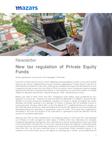
New tax regulation of Private Equity Funds
Law 2010 of 2019 (new tax reform), which replicated and expanded the content of Law 1943 of 2018 (previous tax reform), established the new tax framework applicable to Private Equity Funds (PEFs) and Collective Investment Funds (CIFs). Although the substantial change to the tax treatment of such investment vehicles comes from Law 1943 of 2018, the last tax reform introduced material changes regarding the definition of beneficial, beneficial, or real beneficiary, as well as the creation of a Single Registry of Beneficial, Beneficial or Real Beneficiaries -RUB- maintained by the Dian.
Before Law 1943 of 2018, FCPs and FICs, managed by trust entities, were considered as non-taxpayers of income tax. Likewise, the amounts that they distributed or credited in account to their affiliates in the part coming from dividends, valuations of shares or bonds convertible into shares (Boceas) and profits received in the alienation of shares or Boceas did not constitute income or occasional profit. Likewise, Article 368-1 of the Tax Statute (E.T.) established that such vehicles, or their administrators, would only make withholding at the source with respect to the income effectively distributed among the subscribers or participants, reason for which, if the same were capitalized or reinvested in the fund, the taxation of the subscribers or participants would be deferred until the moment of its effective distribution.
Although Law 1943 of 2018 maintained the non-taxpaying nature of FCPs and FICs, and extended such effects to funds managed by other types of entities other than fiduciaries (for example, Investment Management Companies -SAI-), the deferral of income (and therefore of tax) was limited until the distribution of profits when: (i) the fund is closed, its shares are traded on a Colombian stock exchange and has an active secondary market; and (ii) the fund is not owned directly or indirectly, in more than 50%, by the same beneficial owner or economically linked investment group, or by members of the same family up to a 4th degree of consanguinity or affinity, and provided that the beneficial owners of the fund or investment group do not have, individually or jointly, control or discretion over the distributions of the fund.
Excluded from complying with the second requirement mentioned above are FCPs and FICs whose exclusive purpose is to develop new innovative ventures and raise venture capital for such purpose. For this purpose, the value of the investment in the fund must be less than 600,000 UVT (today $21,364'200,000) and there cannot be any economic or family relationship between the developer of the new venture and the venture capital investors. Likewise, the new tax reform extended for one more year (until June 30, 2021) the transition regime for FCP and FIC in force as of December 31, 2018. In this sense, if by that date the conditions that allow them to defer tax income are not met, their profits will be understood to be incurred in the taxable year 2021.
On the other hand, Law 2010 of 2019 defines the beneficial, beneficial or real beneficiary as any natural person that ultimately owns, controls or benefits -directly or indirectly- from a legal entity or structure without legal personality, when it meets any of the following conditions: (i) owning, directly or indirectly, 5% or more of the capital or voting rights of the unincorporated company or structure; (ii) benefiting in 5% or more of the yields, profits or assets of the unincorporated legal person or structure; and (iii) exercising direct or indirect control, individually or as a family member (up to the 4th degree of consanguinity or affinity). Finally, but being almost the most transcendental creation of the whole economic growth law and subject to regulation, the law creates the Sole Registry of Effective, Final or Real Beneficiaries -RUB-, which will be administered by the DIAN and will contain the information of the real owners of wealth in Colombia.
The issue of FCPs and FICs will have special relevance in the coming months, since the stock exchanges of Colombia, Lima and Santiago are in the process of agreeing on their eventual integration. This step takes place within the framework of the consolidation of the Pacific Alliance and will imply that, as was done regarding the tax treatment of pension funds in each of the member countries, a homogeneous tax legislation will be adopted for FCPs and FICs.


